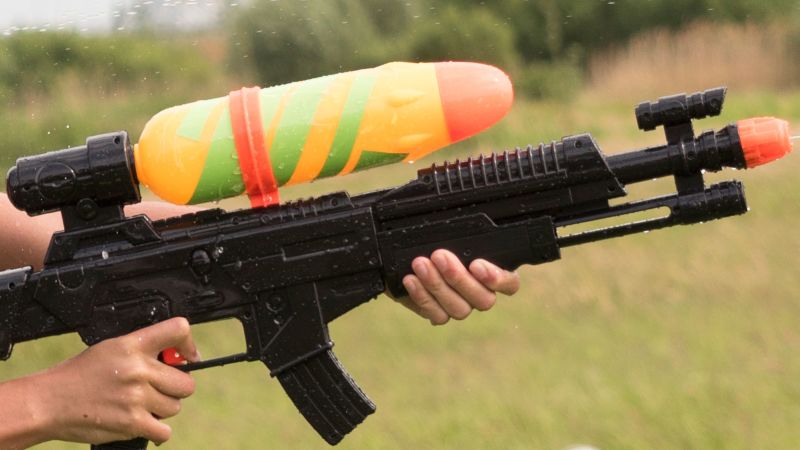Editor’s Note: Kara Alaimo is an Associate Professor of Communication at Fairleigh Dickinson University. Her book, “Over the Influence: Why Social Media Is Toxic for Women and Girls — And How We Can Take It Back,” was recently published by Alcove Press. XThe opinions expressed in this op-ed are her own. Read more opinion pieces at CNN.
CNN —
One morning this week, I opened the blinds in my bedroom and saw a young man walking down my driveway with what appeared to be a gray gun. Luckily, I kept my cool and emailed photos to my neighbors, and they quickly let me know what was going on. Kids in my town were playing a game called “Senior Assassin,” chasing each other down with water guns. This is happening all across the country, and we cannot expect all of these incidents to end peacefully.
Courtesy of Kara Alaimo
Kara Alaimo
According to USA Today, the game is typically played off school grounds, and some kids have used it to create content for TikTok, Instagram, and YouTube (of course). Not surprisingly, the game has led to numerous calls to 911, car accidents, school evacuations, and dangerous confrontations with real gun owners.
As the school year draws to a close, it's not surprising that classrooms of kids who have been unusually isolated from their peers are trying to find ways to bond and have fun with one another. But communities need to provide kids with safer outlets to meet these needs. And parents, schools, lawmakers, and tech companies need to take action to protect kids from this potentially deadly game.
Of course, it's easy to see why kids are playing “Senior Assassin”: They're trying to connect with one another. Their generation is spending less time with friends and more on social media. In 1999, high school seniors went out on average 2.78 times a week, according to the University of Michigan's “Monitoring the Future” study. By 2020, that number had fallen to 1.89.
So it's no surprise that the game really took off in the early 2010s, just as kids were spending more time on their phones and creating content for social media. On top of that, most of today's high school students have spent a significant portion of their high school years isolated from their peers during the COVID-19 pandemic.
But this is a very dangerous way they try to satisfy this desire. As police have warned, people who believe they are in danger from real guns may use lethal force against children playing this game. According to the Pew Research Center, more than 40% of American adults own a gun in their home, and 72% of gun owners say their primary reason is for defense. Just last year, 20-year-old Kaylin Gillis was shot and killed in upstate New York after she and three friends accidentally drove into the driveway of a home they mistook for a friend's.
Unfortunately, mistakes involving kids and guns are common in the U.S. According to KFF, guns were the leading cause of death among children ages 1 to 17 in 2020 and 2021, killing more children than illness or other types of injuries.
Clearly, this game has the potential to lead to tragedies, is unfair to local residents who may find it frightening, and could overburden local police departments who aren't likely to be inundated with calls about kids running around their neighborhoods with what could easily be mistaken for real weapons.
Instead, parents, students, schools, libraries, and community centers should organize other opportunities for children to interact with one another and say goodbye. The possibilities are endless: think dance parties, movie marathons, quiz nights, amateur/open mic nights, field days, and other athletic competitions.
Parents should not allow their children to play “Senior Assassin.” In some cases, schools could consider playing it on school grounds (in the gym or off school grounds with a sign prominently informing passersby of what's going on) to discourage it from being played in public (or even private property like my house), where it could be misleading.
More broadly, tech companies could curb this trend and other more violent imagery by announcing that they would shadow ban content that shows people shooting at each other (as we've warned before, people who witness violent acts in the media are more likely to become physically violent towards others).
Subscribe to our free weekly newsletter
And of course, lawmakers need to pass laws prohibiting toy manufacturers from making toy guns that look like real guns. If a young person on my property had a bright orange squirt gun instead of a gray one, it would have been a clear signal that my family was not at risk.
It is natural that young people in our society want and need to connect, and parents, schools and communities must enable them to connect in healthy ways, but not force them into playing potentially deadly public games.



